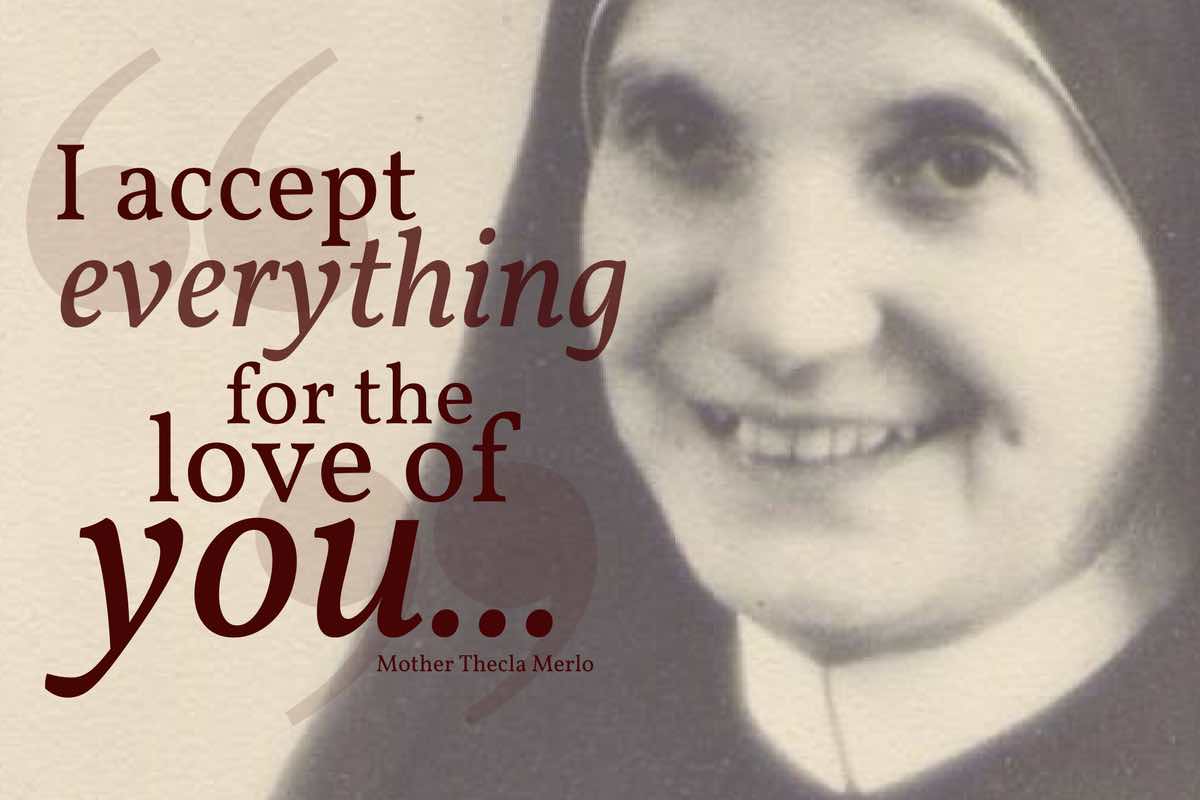Mother Thecla's Spiritual Journey
Mother Thecla Merlo was a contemplative in action; a simple soul who knew her place before God and with her fellow sisters
Her life was one of continuous adhesion to the will of God We know, however, peak moments which showed the spiritual evolution that was taking place.
The Beginnings
The first involved the Spiritual Exercises. With Miss Maria Chiarla, the young lady who used to give her private lessons, Teresa used to go to Mizza, Monferrato for Spiritual Exercises. Those encounters with God in prayer (of which we know nothing) must probably have affected her in such a way that she desired to give herself to God through religious consecration.
Another important moment in her journey of faith was the encounter with Father Alberione on June 27, 1915. This was proven by the intensely committed life she led afterwards.
Her first written spiritual notes date back to 1926. One who reads those notes can say that they reveal a woman with high spiritual commitment. While the Congregation was still at its beginning, Maestra Thecla already showed a strong interior dynamism. A manuscript dated 1926 records significant quotes from her:
“Certain moments were so dark that nothing could be understood. As for me, I was never afraid, notwithstanding the talk and the crosses that were in the house.”
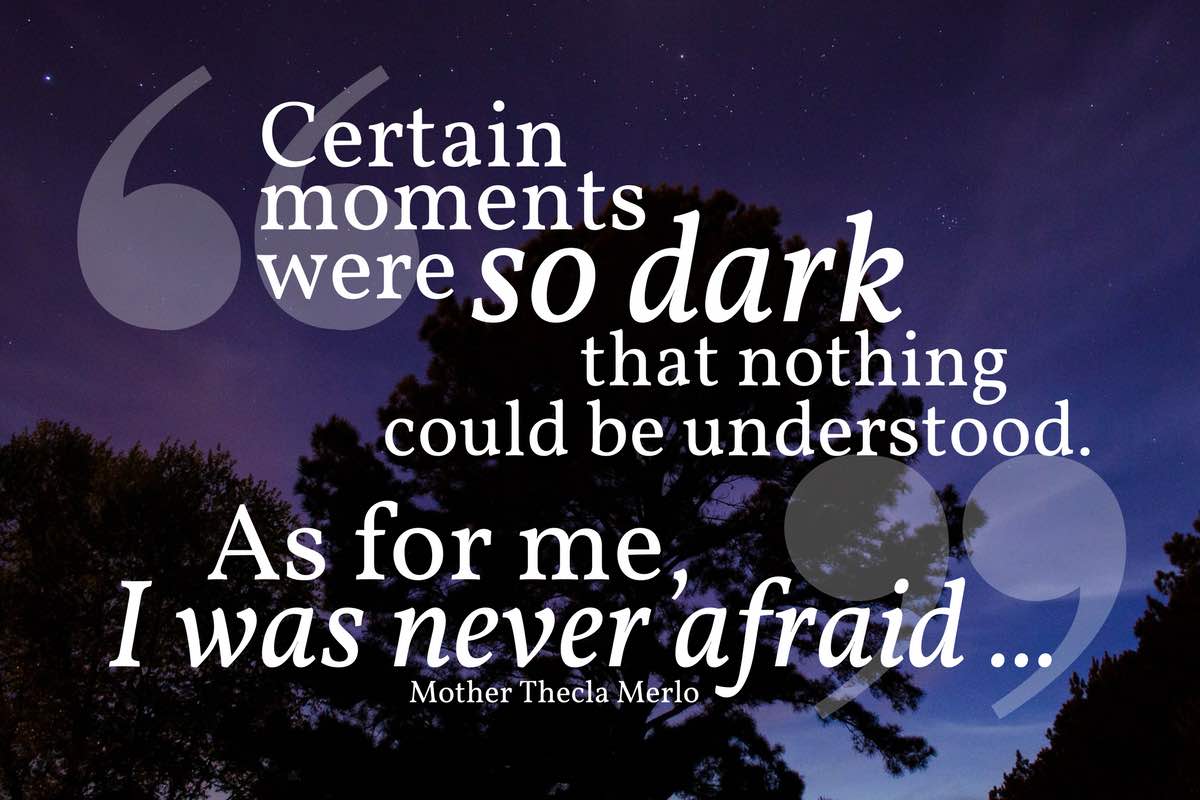
Fortitude in the Times of Darkness
This “I was never afraid” clearly tells that Mother Thecla had already found her anchor –
Solid as an eternal rock. That rock was the Lord and the specific vocation which came from him. The text cited leaves it understood that she had already made the interior deliberation of living for God and before God with a precise goal: sanctity. In fact, throughout her life, sanctity resounded in her heart as a personal call.
In 1963, she wrote: “Lord, though I am the most miserable creature, you want me to be a saint. Many times, especially in the ˈ30ˈs she responded to this intimate call with words which seemed to be those of Saint Joseph Cottolengo:
I want to be a saint.
I want to be a great saint.
I want to be a saint soon.
To these, she used to add the expression of total trust: “By myself, I can do nothing. With God, I can do everything.” This goal was the light which illumined everything, the point of attraction and of unification of her entire life. However, the sanctity she sought was not made up of extraordinary things but was realized in the ordinary things of daily life.
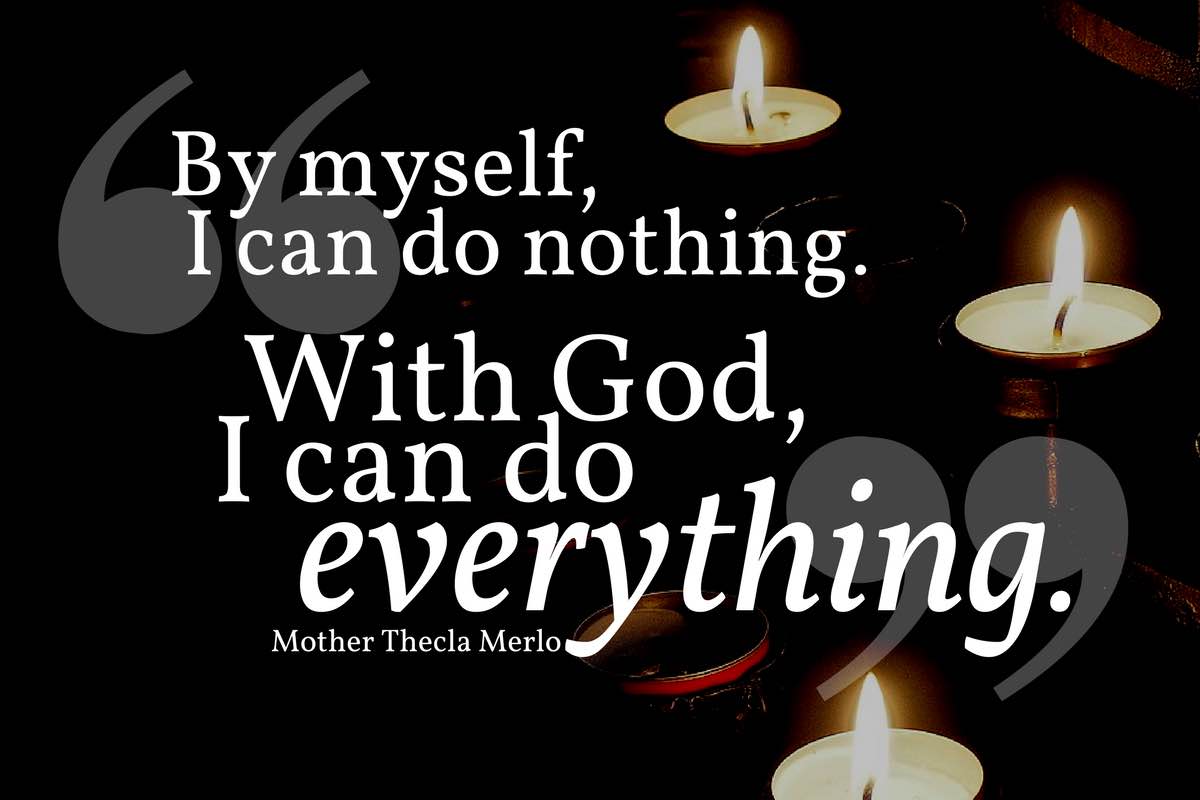
Ordinary Saint
To become a saint but in ordinary things….
Sometimes the devil tempts us to examine ourselves on great things and not on ordinary things.
These ordinary things included the demands of the apostolic, communitarian, and consecrated life which make up the vocation of a Daughter of St. Paul.
Nourished by the desire for sanctity which is based on humility and confidence, Maestra Thecla undertook her spiritual journey. We get an idea of her evolution from the plain, unadorned letters sent her as spiritual guidance by Father Alberione. From those letters we gather that in the beginning, Mother Thecla made efforts to remove self-confidence in order to entrust herself totally to God’s mercy. The means she used particularly were: examination of conscience, silent and operative charity which was the greatest of all things, assiduous dedication to prayer lived out in the Institute’s practices of piety, a spiritual discipline which held humility and the spirit of sacrifice as its components.
Still basing ourselves on the letters of Father Alberione, we note that in 1941, Mother Thecla’s spiritual life underwent a deep change: she made a turn towards the way of simplicity and of passivity, characterized by the desire for a hidden life. Moreover, she deeply experienced dark nights. Her spiritual director affirmed this turning point which introduced Mother Thecla into a more contemplative phase.
He told her:
Let yourself be drawn by the Lord….
Let us love the Lord with simplicity and let us continue to walk towards Divine union so that our soul may not desire anything else but to rest in God.
Father Alberione’s letters of subsequent years sustained this increasingly passive journey which was oriented to configuration into Christ’s mystery! “To live in Christ”; to let ourselves be guided by Jesus in full confidence; to taste his continuous presence in our soul which speaks, comforts, sanctifies. Mother Thecla thus opened her life to the mystery of indwelling. We further find confirmation of this in her spiritual notes:
To live the intimacy with the Divine Master: the mind, the will, the heart, the deeds, the senses: hands, feet, eyes, hearing – all for him and with him. To arrive at the “It is no longer I who live, it is Jesus who lives in me”.
Thus she entered into the mystery of Christ by letting herself be guided even in little things and by removing the obstacles to the actions of the Holy Spirit.

Her interior attention always focused on what pleased the Lord condensed in the expression: “Glory to God and peace to men.” She entered into full abandonment to the divine will.
From 1950 on, Mother Thecla did not have other resolutions except this full abandonment to the Lord. Her spiritual life became simpler and it acquired a Trinitarian dimension. She reveals it to us:
Sanctity! I desire it. To live the Trinitarian life as Mary Most Holy did. To trust in the heavenly father, to love the Son who came to save me, to confide in the grace of the Holy Spirit.
The heavenly Father is always near me, is within me, thinks of me and provides for everything. Jesus is with me, the Holy Spirit sanctifies me.

Sanctity, then, is identified with intimate union with the Trinity who dwells within her. And she felt very much at home living in that divine presence:
Adoration, union, recollection and …staying in the company of such guests. Then, because we are children, in the Trinity we make up one family.
Into this intimate and familiar union with the Trinity, she wrote: “My God, that I may be hidden in you, get lost in you, as a drop of water in an ocean.”

It was a union unto immolation, expressed in the offering of her life in 1961, exactly on the feast of the Blessed Trinity. This aspiration to be in the Trinity, this great nostalgia for the Eternal was translated into word which was very familiar to her: Paradise. It was the place of the reward, the stable place, but above all, the fullness of communion: we shall always be with the Lord.
One realizes that hers was a life in the Holy Spirit, which she expressed thus:
O, Divine Holy Spirit, give me your love, your gifts. I want to let you work in me without putting impediments to your sanctifying presence.
The central nucleus: God as Father and total trust in him.
“Let the good Lord be sought always and everywhere.” Hence, she expressed her resolutions in a wholistic language: “All the minutes, the hours, the days of this year, I want that they be all of God and only for him. To seek only the glory of God, the good of souls, Paradise.”
Trust and abandonment thus became the attitude which qualified all her spiritual life:
To abandon myself like a little child. To trust the Lord completely, in all things.”
The synthesis of this rapport with God based on humility and trust was in her spiritual note of 1949:
To humble myself in order to draw God to me; for this it would be enough to think of my nothingness and through trust to raise myself so high to reach God.

The root of this attitude toward God at the beginning of her Pauline life made up the sum total of the spiritual physiognomy of Mother Thecla. In the perspective of that filial trust she lived the globality of the Pauline vocation. She wrote:
“The spirit of Pauline piety is to live like Jesus: filial dependence on the Father in the Holy Spirit, particularly in littleness, docility, trust, in constant seeking for what pleases him.”
Coherent to this vision, Mother Thecla’s spiritual life developed in such a way that certain constants such as the following acquired special importance:
Interiority and Interiorization of the Word
Interiorization and adherence to the Gospel were her roads to transformation. She wrote: “The Gospel helps us to transform our life. Always trust the Gospel; it is the Word of God.” Hence, she practiced various evangelical virtues such as: meekness, humility, simplicity, transparency, sincerity, benevolence, and forgiveness.
But her gaze turned towards interiority refined her interpersonal encounter with the Master present in her heart and her life became an imitation, a following, a purification, an immersion with Christ in the spirit of the apostle Paul: “I live now not I, but it is Christ who lives in me.”
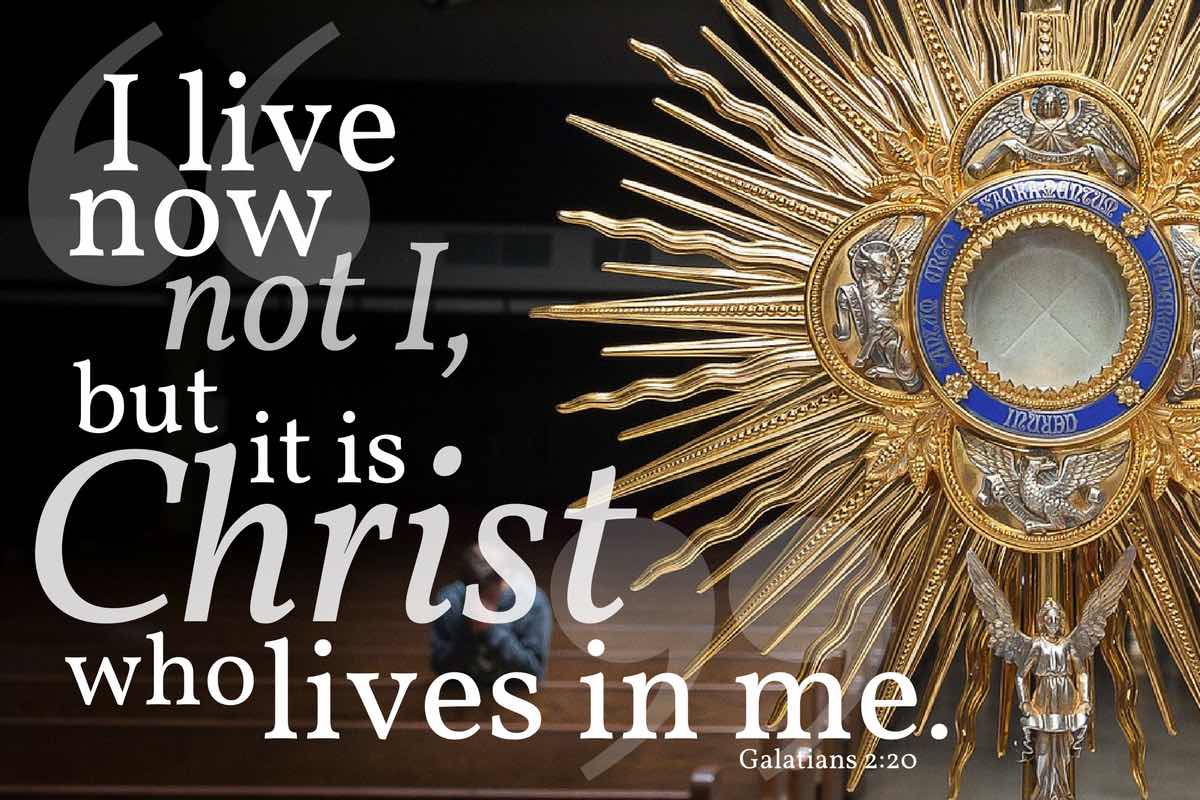
Spiritual Strength
Her spiritual notes reveal that Mother Thecla had a great sense of her nothingness. Everywhere one finds her expressing her “nothingness” juxtaposed against another reality which was: God is everything. Therefore, “every good thing comes from God, all is his, full, complete, total confidence.”
Through a characteristic feature: strength. She assumed an orientation characteristic of her: “By myself, I can do nothing; with God I can do everything.” This capacity to do everything with God extended to every sector of her life: apostolic initiative, communitarian life, knowledge, poverty, suffering, economic investments, travels, etc. For this, she feared neither obstacles, nor weakness, nor fatigue. She was as if carried by God’s strength.
Loving Adhesion to His Will
Another essential word which determined the spiritual journey of Mother Thecla was the will of God. This expression summed up everything: vocation and mission, health and sickness, life and death, the human and the divine. That sense of God’s will filled her entire life from beginning to end can be gathered from her writings:
“I want to become a saint by doing God’s will always and in all things….Let it always be: not what pleases me but what pleases you, my God.”
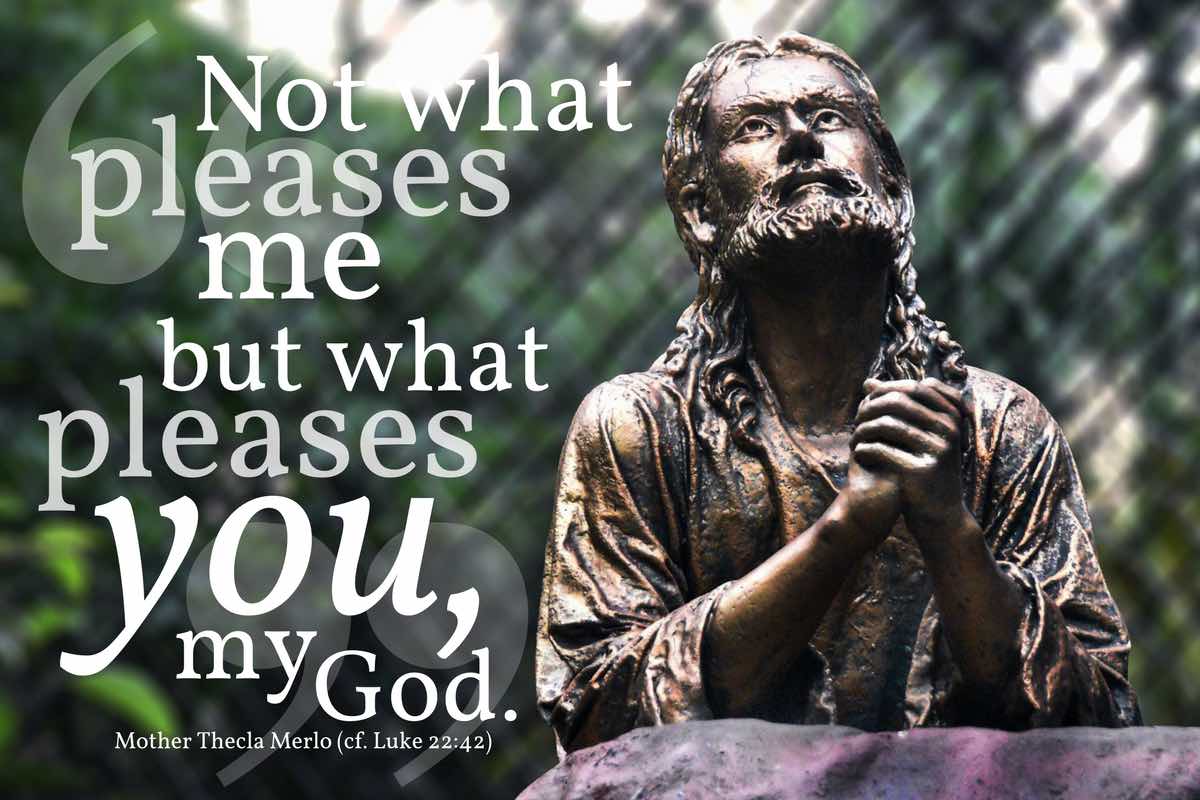
And the way to know and to adhere to God’s will was through prayer:
To do God’s will is to glorify him. Mother Thecla seemed to have translated into life Jesus’ attitude towards the Father: “I always do what pleases him” (John 7:29).
All the segments of her life were unified into doing the Father’s will which was expressed as apostolicity. Her preoccupation was not so much the use of technological means as the end for which they were used, that is, to let the Lord be known and loved.
Spiritual Life with a Marian “Color”
The same filial dimension which characterized her rapport with God, marked her relationship with Mary. Mary was the Mother to whom Mother Thecla entrusted everything; herself, the Daughters of St. Paul, the Congregation. The best expression of her devotion is prayer of entrustment which is scattered throughout her spiritual notes. We cite one example dated October 1954:
I entrust everything to you, O Mary: all my person, my senses, my soul and its faculties, the merits which with God’s grace I may gather, whether meritorious, expiatory, intercessory.
I put all these into your hands. Do with them as you want, O Mary. I know thay are in good hands and that is enough for me. Keep me always beneath your mantle and do so also to all the Daughters of St. Paul. Keep us close to you and bring us to heaven. That none of us be missing! You are our only hope in life and in death; in eternity you will be our joy. O Mary, I entrust myself to you. O Mary, I trust in you.
Because Mother Thecla animated one of the most modern and active forms of apostolates in the church in the modern age, we can draw two conclusions from her life:
Here we have a summary of her spiritual journey in the words of Father James Alberione affirming that she reached the point of eliminating every resistance to grace.
“The Lord made her what he wanted her to be, because as far as I know, he never met any resistance from her. Never a resistance to God’s will. One could feel that it was the Lord who sustained her. She was a contemplative soul. She also knew how to ask help from human beings but it was always God first. Everything should come from God and all was from God.”
Her life was integrated: “If there is no recollection and spirit of prayer we cannot do good to souls.”
With all the busyness of the apostolic mission Mother Thecla proved that we can be highly contemplative, as long as we open ourselves us to God’s action. Contemplation does not impede intense action. For her, the apostolate was not simply activity but a prolongation of the apostolate of Jesus and as such, it unites one to God through diffuse contemplation:
“The apostolate is vital prayer which unites one to God. Contemplation or the divine life in us should always be present in us so that when we give (God’s Word) through a book, we give grace.”
Mother Thecla Merlo accepted the end of her life with the same dispositions of fulfilling the will of God as she had in her daily life. Though she was having difficulty breathing, she said, “I accept everything for the love of you and as a penance. I offer all for the needs of the Congregation, for the Pope, the Vatican Council, for the Founder, for the entire Congregation. Thus she ended her life in total submission to the Trinity who was calling her home, home to a heaven that she strove for all her life. She passed to eternal life on February 5, 1964.
